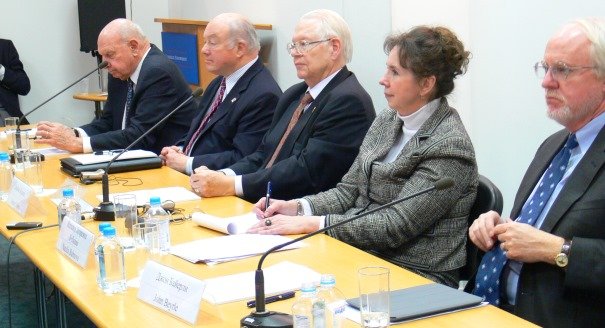Registration
Thank you!
You will receive an email confirming your registration.
Despite the “reset” of U.S.-Russian relations during the first Obama administration, tensions seem to be increasing between Moscow and Washington. International observers point to the U.S. Magnitsky Act, new Russian regulations on child adoption by U.S. citizens, or the Syria question as evidence of these tensions. The topic of Russian-American reconciliation was discussed at the Carnegie Moscow Center by a group of former U.S. ambassadors to Moscow, including Thomas Pickering, Jack Matlock, and John Beyrle. Carnegie’s James Collins, who served as the U.S. ambassador to Russia from 1997-2001, moderated the discussion. Carnegie Moscow Center’s Natalia Bubnova opened the meeting.
Economic Cooperation Plays the Key Role
- Developing U.S.-Russian Cooperation: While many see the U.S.-Russian relations as critically strain, the economic cooperation is successfully developing, Pickering asserted.
- Need for Recognition of the Importance of Economic Issues: Economic cooperation between Washington and Moscow has been mutually perceived as an issue of crucial significance, Beyrle said. To emphasize the importance of economic cooperation, former Russian and American ambassadors to Washington and Moscow highlighted it at the top of their joint statement on how to enhance the bilateral cooperation.
Mutual Understanding as Precondition for Tighter Cooperation
- Not the Cold War: According to Matlock, comparing the state of current U.S.-Russian relations to the Cold War is a great exaggeration. He explained that the U.S.-USSR relations were based on fundamental disputes (communism vs. capitalism, democracy vs. authoritarianism, etc.), while today’s challenges are not as crucial.
- Foundations for Agreement Are Present: Beyrle continued, pointing out that for many, U.S.-Russian relations may be on a downslope. Nevertheless, Moscow and Washington have a number of issues on which they can find a foundation for common understanding. Even while discussing strategic issues such as Syria and nuclear weapons, Russian and American diplomats may find things that they agree on, he concluded.
- It Is Not Only About Washington and Moscow: Pickering agreed that there is ground for common understanding between Washington and Moscow. He said that the United States and Russia are closer than it may appear on issues such as Iran or the Arab-Israeli conflict. Nevertheless, he explained that in the latter issue, it is not the shape of the agreement that is a problem but rather getting the involved parties to agree on anything.
Further Steps to Foster More Effective U.S.-Russian Cooperation
- Former Ambassadors’ Meetings as a Sign of Willingness to Cooperate: Pickering underlined that meetings of former ambassadors to Russia and the United States are a positive and exceptional phenomenon. They do not occur between other countries on such a large scale. The fact that they continue and bear measurable fruit is a sign of growing cooperation, he continued.
- Steps on Both Sides Have to be Taken: As Matlock emphasized, mutual cooperation and understanding have been growing. Nonetheless, some historical distrust remains. For this to change, Matlock said, both the United States and Russia have to transform their attitude. For example, he pointed out that the general American perception of a U.S. victory in the Cold War is untrue. At the same time, Russia still tends to perceive the United States as a competitor, even though current international relations are not a zero-sum game. Both of these phenomena have to change to guarantee better bilateral cooperation, Matlock asserted.
- Security Problems: Collins stated that lack of trust is a core problem, especially while discussing security issues. The United States and Russia should find a new platform to discuss these challenges.
- Ballistic Missile Defense: Pickering underlined that, although President’s Obama recent decision to change the structure of ballistic missile defense in Europe did not receive the public recognition it deserves, it is a step in the right direction for U.S.-Russian cooperation to develop.
